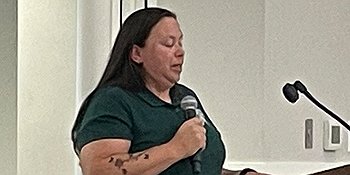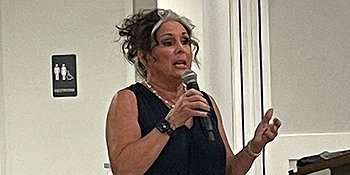Testimonials Illustrate Importance Of Kosciusko Community Recovery Program
October 21, 2024 at 9:56 p.m.

Several testimonials at a meeting on the Kosciusko County Jail's newest recovery program illustrated the importance of community and recovery.
And those two aspects are part of the new program's name.
The Kosciusko Community Recovery Program (KCRP) is focused on increasing individuals' success upon their release from custody. A public meeting held Monday at the Zimmer Biomet Center Lake Pavilion in Warsaw focused on informing the community about the program while addressing questions and hearing suggestions on how to help inmates after they're released from Kosciusko County Jail.
KCRP Resource Navigator Shanna Wallen, who was first hired into the position in July, said incarceration and addiction are communitywide issues.
"I first saw the need when I volunteered for the Jail Chemical Addiction Program," said Wallen. "Everyone deserves the opportunity for growth and lasting change. I've known for years how badly a program like KCRP was needed, and I was willing to do anything I could to support that. I did not know I would be the one building it."
Both Wallen and Kosciusko County Sheriff Jim Smith said it was Wallen's responsibility to determine the resource navigator's role within the jail.
"The vision of KCRP is to provide support, education and resources to inmates, with a heavy focus on those who are 60 to 90 days from their release date," said Wallen. "Pre-release services include a needs assessment that I conduct, mental health services and peer coaches from our community partners. Post-release services include referrals to community partners ... and services specific to each person's situation."
Wallen said the program is for those who are ready to break the cycle and make better choices. Recently, Wallen assisted four inmates close to release with a variety of matters, including transportation, community resources and physical support during a court hearing.
Smith provided history on how the program was created. Prior to taking over as sheriff, Smith said there was movement within the sheriff's office about having an Integrated Reentry and Correctional Support (IRACS) program at the jail. As conversations progressed, the sheriff's office decided to have the program at the jail, but led by the sheriff's office rather than a third party.
Smith tasked JCAP Coordinator Casey Trombley on leading the charge in getting a resource navigator hired for KCRP. He recalled meeting with two inmates who were about a month out from being released from the jail prior to KCRP starting.
"Their dialogue with me was very similar," said Smith. "'Sheriff, I get out of here in a month. I don't want to come back here. But I know me and if I don't change something, that's going to be what happens.'"
Wallen said one of her favorite aspects of the job is that no two days are the same.
"Some days, I am connecting inmates to recovery homes or working on replacing birth certificates and identification cards," said Wallen. "Coming to jail can mean losing everything you have ... their family, their friends, their job. I've talked to people that their vehicle got impounded when they were arrested and it literally had all their clothes, their identification, inside. Every day brings something different, but it all works toward the same goal. I'm willing to listen and encourage, and that makes a huge difference to some of them ... I share my own story with them, of how I've never been incarcerated, but I've experienced many other hardships. I was a teen mom, I was an addict, I was told I was worthless and stupid. I was told I would never overcome my addiction ... Being able to share not just what I went through, but also who I have been able to become despite my past shows them that they, too, can use their past to help others."
Diane Kern, a volunteer with Living in Transition Effectively (LITE), recalled becoming a mentor to a female inmate and allowing the woman to reside with her until she was able to safely move to Tennessee.
She said when the woman was released from custody, she had very few personal belongings on her.
Kern said the woman told her she would have had no choice but to go to a traphouse if Kern hadn't offered her a place to stay. A traphouse is a phrase typically used to describe a drug den.
"I was blown away that there was nothing else for her," said Kern. "Here was somebody who was asking for the help, who had earned the help, who was doing everything in her power that she knew to get the help, and if she hadn't been put into my life, I'm not sure where she'd be right now. I just can't stress how important this step is."
Wallen said the community needs to demonstrate understanding and provide second chances to those released from jail.
"Access to housing, employment, transportation, community support for these released inmates ... that's what they need to change their lives," said Wallen.
Following the testimonials, a Q&A panel was held involving Smith, Kosciusko Superior Court I Judge Karin McGrath, Kosciusko County Chief Probation Officer Tammy Johnston and Kosciusko Circuit Court Judge-elect Matt Buehler.
Some aspects community members asked the panel to consider with KCRP included the need for more transitional housing such as Fellowship Missions and Serenity House. One citizen also expressed concern with how criminal backgrounds affect them as a parent with attending their child's school activities. Another citizen emphasized the importance of having additional meetings to continue these conversations within the community.
Several testimonials at a meeting on the Kosciusko County Jail's newest recovery program illustrated the importance of community and recovery.
And those two aspects are part of the new program's name.
The Kosciusko Community Recovery Program (KCRP) is focused on increasing individuals' success upon their release from custody. A public meeting held Monday at the Zimmer Biomet Center Lake Pavilion in Warsaw focused on informing the community about the program while addressing questions and hearing suggestions on how to help inmates after they're released from Kosciusko County Jail.
KCRP Resource Navigator Shanna Wallen, who was first hired into the position in July, said incarceration and addiction are communitywide issues.
"I first saw the need when I volunteered for the Jail Chemical Addiction Program," said Wallen. "Everyone deserves the opportunity for growth and lasting change. I've known for years how badly a program like KCRP was needed, and I was willing to do anything I could to support that. I did not know I would be the one building it."
Both Wallen and Kosciusko County Sheriff Jim Smith said it was Wallen's responsibility to determine the resource navigator's role within the jail.
"The vision of KCRP is to provide support, education and resources to inmates, with a heavy focus on those who are 60 to 90 days from their release date," said Wallen. "Pre-release services include a needs assessment that I conduct, mental health services and peer coaches from our community partners. Post-release services include referrals to community partners ... and services specific to each person's situation."
Wallen said the program is for those who are ready to break the cycle and make better choices. Recently, Wallen assisted four inmates close to release with a variety of matters, including transportation, community resources and physical support during a court hearing.
Smith provided history on how the program was created. Prior to taking over as sheriff, Smith said there was movement within the sheriff's office about having an Integrated Reentry and Correctional Support (IRACS) program at the jail. As conversations progressed, the sheriff's office decided to have the program at the jail, but led by the sheriff's office rather than a third party.
Smith tasked JCAP Coordinator Casey Trombley on leading the charge in getting a resource navigator hired for KCRP. He recalled meeting with two inmates who were about a month out from being released from the jail prior to KCRP starting.
"Their dialogue with me was very similar," said Smith. "'Sheriff, I get out of here in a month. I don't want to come back here. But I know me and if I don't change something, that's going to be what happens.'"
Wallen said one of her favorite aspects of the job is that no two days are the same.
"Some days, I am connecting inmates to recovery homes or working on replacing birth certificates and identification cards," said Wallen. "Coming to jail can mean losing everything you have ... their family, their friends, their job. I've talked to people that their vehicle got impounded when they were arrested and it literally had all their clothes, their identification, inside. Every day brings something different, but it all works toward the same goal. I'm willing to listen and encourage, and that makes a huge difference to some of them ... I share my own story with them, of how I've never been incarcerated, but I've experienced many other hardships. I was a teen mom, I was an addict, I was told I was worthless and stupid. I was told I would never overcome my addiction ... Being able to share not just what I went through, but also who I have been able to become despite my past shows them that they, too, can use their past to help others."
Diane Kern, a volunteer with Living in Transition Effectively (LITE), recalled becoming a mentor to a female inmate and allowing the woman to reside with her until she was able to safely move to Tennessee.
She said when the woman was released from custody, she had very few personal belongings on her.
Kern said the woman told her she would have had no choice but to go to a traphouse if Kern hadn't offered her a place to stay. A traphouse is a phrase typically used to describe a drug den.
"I was blown away that there was nothing else for her," said Kern. "Here was somebody who was asking for the help, who had earned the help, who was doing everything in her power that she knew to get the help, and if she hadn't been put into my life, I'm not sure where she'd be right now. I just can't stress how important this step is."
Wallen said the community needs to demonstrate understanding and provide second chances to those released from jail.
"Access to housing, employment, transportation, community support for these released inmates ... that's what they need to change their lives," said Wallen.
Following the testimonials, a Q&A panel was held involving Smith, Kosciusko Superior Court I Judge Karin McGrath, Kosciusko County Chief Probation Officer Tammy Johnston and Kosciusko Circuit Court Judge-elect Matt Buehler.
Some aspects community members asked the panel to consider with KCRP included the need for more transitional housing such as Fellowship Missions and Serenity House. One citizen also expressed concern with how criminal backgrounds affect them as a parent with attending their child's school activities. Another citizen emphasized the importance of having additional meetings to continue these conversations within the community.


